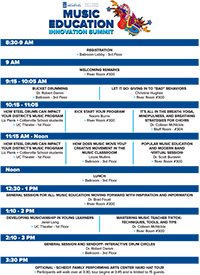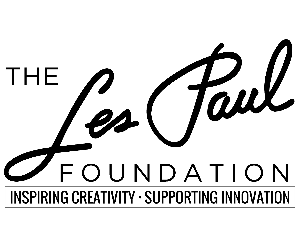Memphis Music Education Innovation Summit
Friday, June 24 I 9 AM - 3 PM
University Center
FREE
 The University of Memphis Rudi E. Scheidt School of Music invites music educators
to the inaugural Memphis Music Education Innovation Summit. This one-day summit is
designed to build a community around unorthodox, outside-the-box music teaching and
learning that defies the conventions of a typical band, orchestra, chorus, or general
music programs. We hope to showcase and celebrate the cutting edge of music education
right here in Memphis!
The University of Memphis Rudi E. Scheidt School of Music invites music educators
to the inaugural Memphis Music Education Innovation Summit. This one-day summit is
designed to build a community around unorthodox, outside-the-box music teaching and
learning that defies the conventions of a typical band, orchestra, chorus, or general
music programs. We hope to showcase and celebrate the cutting edge of music education
right here in Memphis!
Join us for a day of inspiring keynotes, interactive workshops, and participatory music-making highlighting innovative practices in music education. While the Summit will feature regionally- and nationally-known experts in progressive music education, it will also stay grounded locally by prioritizing the stories and insights of Memphis and Mid-South music teachers, leaders, and trailblazers. Continuing education units (CEUs) will be available to participating educators at the conclusion of the event via a simple online process.
The Memphis Music Education Innovation Summit is sponsored in part by the Les Paul Foundation. Inspired by the legacy of guitar and recording legend Les Paul, the Foundation promotes innovative and creative thinking through the support of music education, recording, innovation and medical research related to hearing.
Continuing Education + Professional Development
Attendees can receive five professional development points (PDPs), or one continuing education unit (CEU)!
Sessions
Bucket Drumming- Dr. Robert Damm
Bucket drumming is a style of music that involves drumming on plastic buckets and
other found objects including glass bottles, pots, and pans. Bucket drumming, popularized
by Larry Wright (a drummer from the Bronx), first took hold in New York City in the
1980s. It is interesting to recognize that some of the richest music in the world
(e.g., blues, jazz, samba, reggae, hip-hop, etc.) originated with people living in
economic poverty. Bucket drums are a great introduction to rhythm and percussion and
have become increasingly popular among music teachers because of their affordability,
portability, and accessibility.
Let It Go: Giving in to “Bad” Behaviors- Christine Hughes
Neurodivergent students often exhibit behaviors that are "against the rules" of social
learning. Various forms of stimming such as rocking, flapping, fidgeting with items,
and getting out of one's seat can look like defiance. In reality, these attempts to
regulate the body can do wonders to prepare the mind for the acceptance of new information.
I will share anecdotes from my own experiences working with students on the autism
spectrum and what I discovered by "giving in" to their sensory-seeking actions. My
goal is to empower fine arts educators to have meaningful conversations with SPED
professionals that may lead to de-prioritizing behavior training while improving learning
outcomes.
How Steel Drums Can Impact Your District’s Music Program- Liz Plenk and Collierville
students
In this session, you will learn how to start a steel drum band for beginners of any
age and the many benefits of these instruments in your community. Topics include financial
costs, upkeep of instruments, and the history of these beautiful drums. Volunteers
will have the opportunity to try playing steel drums with assistance from students
involved in Collierville Schools’ steel drum programs.
It’s All in the Breath: Yoga, Mindfulness, and Breathing Strategies for Choirs- Dr.
Colleen McNickle
In a time when students and teachers are subject to unprecedented amounts of stress
and anxiety, choir classrooms often become the hub of release and resilience. This
session will explore the ways in which a practice of movement, mindfulness, and mindful
breathing techniques can engage and energize choral students and teachers. Inspired
by the connection of breath in yoga and meditation to the breath of choir and ensemble,
participants will explore traditional choral and yogic breathing strategies, experience
moments of mindfulness, and learn several short stretch and breath sequences appropriate
for any music classroom.
Kickstarting Your Program- Naomi Burns
You have just taken on a new job as a director. There has been a lot of change within
the program over the past couple of years, and the administration is looking for stability
and consistency. Your job is to build and grow the program. How do you do that? This
session will provide procedures I found to be successful in building and growing a
struggling program.
How Steel Drums Can Impact Your District’s Music Program- Liz Plenk and Collierville
students
(Note: This is a repeat of the 10:15 am steel drum session.)
In this session, you will learn how to start a steel drum band for beginners of any
age and the many benefits of these instruments in your community. Topics include financial
costs, upkeep of instruments, and the history of these beautiful drums. Volunteers
will have the opportunity to try playing steel drums with assistance from students
involved in Collierville Schools’ steel drum programs.
How Does Music Move You? Creative Movement in the Music Classroom- Linzie Mullins
Participants will explore different creative movement techniques individually and
in small groups. We will take our movement ideas and create something wonderful together.
Popular Music Education and Modern Band- Dr. Scott Burstein (via videoconferencing)
While popular music can be a powerful tool for generating interest in music, many
teachers steeped in formal learning struggle to apply informal techniques to unfamiliar
music. This workshop is centered on the belief that all people are musical, demonstrated
quickly and in an enjoyable manner for all ages by leveraging the musical choices
of the individual. This is achieved through the performance of modern band– culturally-relevant
music of students taught through approximation, music acquisition theory, and social
equity.
The challenges of the past two and a half years have caused us to reconsider the meaning and purpose behind our music programs. As we prepare to move forward, we should look to the past to remember valuable lessons that may inform our journey and learn from current thought on the future of the discipline. This session will provide inspiration and information as we seek to find our way to a more inclusive, thoughtful place to educate the next generation of music artists, teachers, and consumers.
Developing Musicianship in Young Learners- Janel Long
Our youngest learners can have big musical ideas. In this session, I will present
ways to develop learners’ musicianship in order to increase the level of rigor in
their musical thinking. Participants will leave with a variety of classroom activities
to support developmental foundational musicianship and an understanding of how to
sequence and scaffold these activities to support developmentally-appropriate creative
musicianship practices.
By the end of this session, participants will be able to:
- Create developmentally-appropriate classroom activities that enhance student rhythmic learning;
- Create developmentally-appropriate classroom activities that enhance student tonal learning;
- Create developmentally-appropriate classroom activities that facilitate students’ creative musicianship skills.
Mastering Music Teacher TikTok: Techniques, Tools, & Tips- Dr. Colleen McNickle
This interactive session will explore the unexpected and beneficial pairing of music
education and the social media app TikTok. By utilizing TikTok as a teaching, learning,
recruitment, coping, and advertising tool, music teachers have the opportunity to
connect to students and communities and eliminate barriers to music learning and making
in an innovative way. Participants will leave the session with practical teaching
resources, TikTok how-to’s, and an understanding of the many benefits of utilizing
social media. They will be empowered to claim their space on the social media app
and to utilize its many videos and teaching tools with their students.
Participants will experience the unique enjoyment of in-the-moment music and the many extra-musical outcomes emphasized in recreational drum circles. In the drum circle, there is no audience; everyone is part of the music. Everyone in the circle plays together, creating his or her own personal rhythmic patterns that fit into the music created by the whole group. The ensemble itself provides an invaluable social experience because the players depend on each other for the ensemble to succeed. Everyone who participates has something to offer the circle and all are welcome.
Funded in part by:

